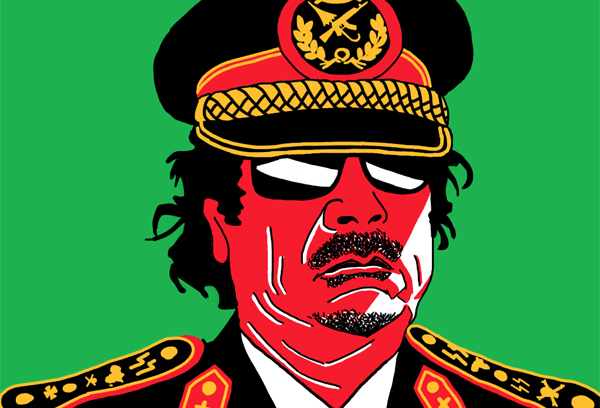How Qaddafi Reshaped Africa
The Libyan leader's dark legacy already includes some of the continent's worst regimes and conflicts

Whenever most of us think of oil-rich, Arab-speaking countries, our imagination performs a trick with our sense of geography, placing us by default in the Middle East.
Of the three North African countries at the heart of the popular uprisings that have riveted the world over the last several weeks, Libya's Muammar Qaddafi has always done the most to assert his country's African identity, staking its prestige, its riches and his own personal influence above all on its place in the continent.
As a deep-pocketed and sparsely populated state ever in need of labor, it has always made sense for Qaddafi to look south. Libya is far too small and peripheral for it to ever aspire to real influence in the Arab world. By comparison, the almost equally small but far poorer countries of nearby West Africa, wracked as they are with chronic misrule and instability, loom temptingly on the horizon as fruit ripe for picking.
Whatever our loose or flawed sense of geography tells us, things have always been thus. For at least 1,000 years, Morocco's kingdoms have periodically thrust southward, establishing shape-shifting realms from present-day Niger all the way to Senegal.
Qaddafi's big idea was to meld a modern, anti-Western, anti-imperial discourse with an impassioned pan-Africanism, an ideal that still resonates deeply across the continent.
For decades in Africa, Qaddafi has put his money where his mouth was: showering petro-dollars on favored clients, funding liberation groups, nurturing political movements, and even paying civil servants. To make sure that no one missed the message, he has often paid a huge portion of the operating costs of the continental body, the African Union.
The problem with Qaddafi's pan-Africanism, like his rule in general is that it has steadily turned into a vessel for his megalomania.
As a reporter with a career-long association with the African continent, I have been in a rare position to witness this trend beginning with some of Qaddafi's earliest African exploits.
In 1983, I scrambled from Ivory Coast to Chad to witness the breakout of war between French and Libyan forces there. Qaddafi had recently spoken of fully "integrating" his country with its southern neighbor.
I quickly found my way to the eastern front, where I watched the conflict from a desert foxhole with French soldiers as they spotted screaming, low-flying Jaguar fighter bombers pounding Libyan positions nearby. That same year, I traveled to Burkina Faso, where Qaddafi had flown to celebrate the seizure of power by a charismatic young army captain, Thomas Sankara, who he clearly saw as a promising understudy.
They met at a military base near the border with Ghana. From there, Sankara's comrade, Blaise Compaoré had recently rallied paratroopers to free Sankara from detention and install him as president.
When I showed up, Qaddafi, surrounded by his famous all female bodyguard corps, angrily objected to my presence and demanded that Sankara not allow an American to ride with the motorcade for their triumphal, flag-waving trip to the capital, Ouagadougou. Sankara, who already knew me well, insisted on my presence. Four years later, he would be dead, murdered by Compaoré, it is widely believed, with Qaddafi's encouragement.
The Libyan's determination to eliminate his erstwhile protégé had nothing to do with me, of course. Most signs point instead to Sankara's refusal to acquiesce in a much bigger decision: to sponsor an invasion of Liberia by Charles Taylor, a leader who is now before the Hague on war crime charges related to his instigation of what would go on to become one of Africa's most horrific conflicts.
Taylor, a kindred megalomaniac, who was trained and financed by Libya, invaded Liberia in 1989. A few years later, I would cover that war for The New York Times as well, watching the rebel leader ride one of the first mass deployments of child soldiers into power.
Were it not for the British intervention in Sierra Leone's civil war next door, another Libyan project, the Taylor-Qaddafi axis would have taken over that country next, before turning its sights on other wobbling dominos nearby, whether Guinea or Ivory Coast. From Liberia, I went to Zaire to cover the fall of Mobutu Sese Seko at the hands of Laurent Kabila, an obscure revolutionary who had cut his teeth in 1960 liberation movements before seemingly going into hibernation. Although Rwanda was his main patron, it turns out that Qaddafi had invested in Kabila, too.
A map of the places where I watched Qaddafi play similar games would stretch from Seychelles to the Central African Republic to Guinea, far vaster even than the Moroccan domains of old.
Even today, when one looks around the continent at zones of conflict, it's a safe bet that the Libyan leader has a line in, ever willing to take long odds that eventually his strategy of cobbling together a pan-African realm will pan out.
As such dreams crumble along with his power, however, Qaddafi will leave a final destabilizing legacy for the continent. Among the million-plus sub-Saharan migrants living in his country, many have already faced suspicion and brutal reprisals because of Qaddafi's use of black mercenaries as a desperate, final rampart.
But there is worse still. It is all but certain that there are new Charles Taylors out there, trained and armed by Qaddafi and eager to mount violent bids for power. And with their patron going down in flames, they will be heading home.
Image by Alex Hoyt